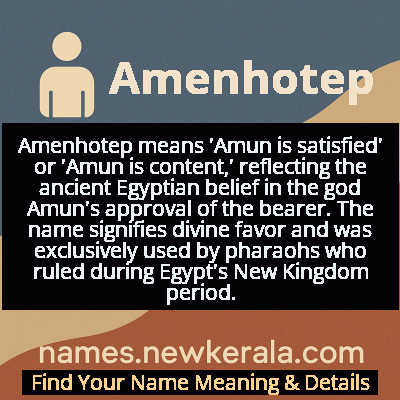Amenhotep Name Meaning & Details
Origin, Popularity, Numerology Analysis & Name Meaning of Amenhotep
Discover the origin, meaning, and cultural significance of the name AMENHOTEP. Delve into its historical roots and explore the lasting impact it has had on communities and traditions.
Name
Amenhotep
Gender
Male
Origin
Egyptian
Lucky Number
7
Meaning of the Name - Amenhotep
Amenhotep means 'Amun is satisfied' or 'Amun is content,' reflecting the ancient Egyptian belief in the god Amun's approval of the bearer. The name signifies divine favor and was exclusively used by pharaohs who ruled during Egypt's New Kingdom period.
Amenhotep - Complete Numerology Analysis
Your Numerology Number
Based on Pythagorean Numerology System
Ruling Planet
Neptune (Ketu)
Positive Nature
Intuitive, analytical, spiritual, and inquisitive.
Negative Traits
Secretive, reserved, aloof, and can be overly critical.
Lucky Colours
Green, yellow.
Lucky Days
Monday.
Lucky Stones
Cat’s eye, moonstone.
Harmony Numbers
1, 5, 6.
Best Suited Professions
Scientists, researchers, spiritual leaders, detectives.
What People Like About You
Depth of knowledge, analytical skills, spirituality.
Famous People Named Amenhotep
Amenhotep I
Pharaoh
Second pharaoh of Egypt's 18th Dynasty who expanded Egypt's borders and established the worker's village at Deir el-Medina
Amenhotep II
Pharaoh
Known for his athletic prowess and military campaigns, maintaining Egypt's empire through numerous successful military expeditions
Amenhotep III
Pharaoh
Ruled during Egypt's golden age of prosperity and artistic achievement, building massive monuments including the Colossi of Memnon
Amenhotep IV (Akhenaten)
Pharaoh
Revolutionary pharaoh who introduced monotheistic worship of Aten and moved Egypt's capital to Amarna
Name Variations & International Equivalents
Click on blue names to explore their detailed meanings. Gray names with will be available soon.
Cultural & Historical Significance
The name embodies the fusion of political power and religious authority that characterized pharaonic rule, where the king served as the intermediary between the gods and the people. The most famous Amenhotep, Amenhotep IV, would later change his name to Akhenaten and initiate one of history's most dramatic religious revolutions by establishing the worship of Aten as the sole deity. This transformation from traditional polytheism to radical monotheism represents one of the most significant religious shifts in ancient history, making the name Amenhotep synonymous with both traditional power and revolutionary change in Egyptian civilization.
Extended Personality Analysis
Individuals named Amenhotep are typically perceived as possessing strong leadership qualities, deep spiritual conviction, and transformative vision. They often exhibit a commanding presence combined with intellectual depth, reflecting the historical figures who bore this name. These personalities tend to be ambitious innovators who aren't afraid to challenge conventions and implement radical changes when convinced of their necessity. There's often a strong sense of destiny and divine purpose associated with the name, suggesting someone who sees themselves as having a special mission or calling.
At the same time, Amenhotep personalities may demonstrate a certain aloofness or detachment, as if operating on a different plane from ordinary concerns. They typically possess great determination and resilience, capable of pushing through opposition to achieve their goals. The name suggests someone who balances traditional authority with revolutionary thinking, much like the pharaohs who both upheld Egyptian traditions while occasionally transforming them. This combination of stability and innovation creates a complex personality profile—someone who respects heritage but isn't bound by it, who leads with confidence but remains open to profound personal and ideological evolution.
Modern Usage & Popularity
In contemporary times, Amenhotep remains an extremely rare given name, primarily used by Egyptologists, historians, or individuals with strong connections to Egyptian heritage and culture. The name sees occasional usage in academic circles or among enthusiasts of ancient Egyptian history, but it hasn't entered mainstream naming practices in any significant way. In Egypt itself, the name is virtually unused for modern children, as it carries overwhelming historical and royal connotations that make it impractical for everyday use. The name occasionally appears in fictional contexts, historical reenactments, or as a symbolic choice for those deeply invested in Egyptology. Its usage trends remain consistently minimal, with no significant spikes in popularity, reflecting its status as a name firmly anchored in antiquity rather than contemporary naming conventions.
Symbolic & Spiritual Meanings
Amenhotep carries profound symbolic weight as a name representing divine kingship, cultural achievement, and spiritual transformation. Symbolically, it embodies the concept of divine favor and approval, suggesting that the bearer operates with the blessing of higher powers. The name evokes images of monumental architecture, artistic mastery, and imperial power, symbolizing the ability to create lasting legacies that transcend generations. It also represents the tension between tradition and innovation, as seen in the dramatic religious reforms of Amenhotep IV/Akhenaten. The name symbolizes the human aspiration to bridge the earthly and divine realms, serving as a mediator between spiritual ideals and practical governance. In a broader sense, Amenhotep represents the peak of ancient civilization—the moment when human achievement, artistic expression, and spiritual exploration reached extraordinary heights, creating a standard against which subsequent ages would measure themselves.

